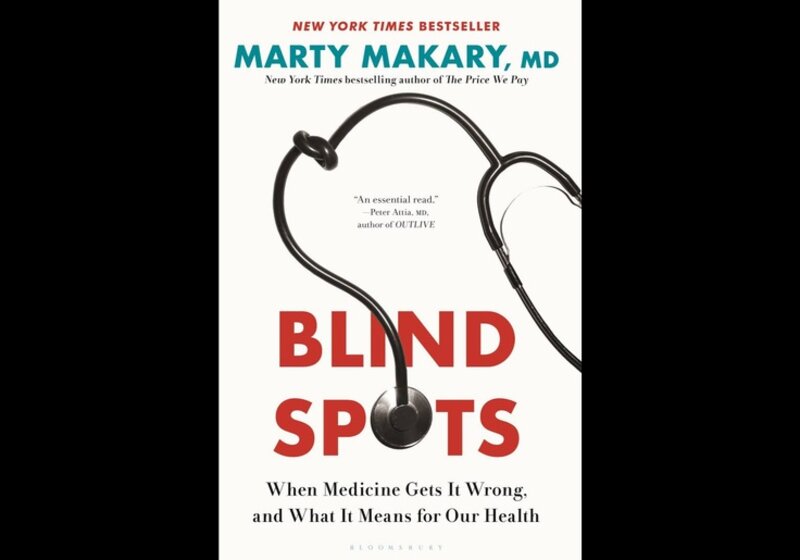6
6
0
Posted 3 d ago
Responses: 3
Marty Makary's book "Blind Spots: When Medicine Gets It Wrong, and What It Means for Our Health" offers a critical examination of medical dogma and its consequences. As a surgeon and public health researcher at Johns Hopkins University, Makary brings a unique perspective to the discussion of medical misconceptions and their impact on patient care[1][4].
## Key Examples of Medical Myths
**Peanut Allergies**
Makary challenges the long-held belief that early exposure to peanuts increases the risk of allergies. He highlights research indicating that reintroducing small doses of peanuts, combined with immune suppressants, can actually be curative for some individuals[4]. This contrasts with the American Academy of Pediatrics' previous recommendation to avoid peanuts altogether, which may have contributed to the rise in peanut allergies[3].
**Hormone Replacement Therapy (HRT)**
The book criticizes the medical establishment's stance on HRT, citing a misinterpreted study that led to widespread avoidance of the therapy. Makary argues that this decision resulted in significant harm, estimating that around 140,000 women died prematurely over two decades due to not using HRT[1]. He emphasizes the importance of recognizing HRT's benefits and challenges the persistent belief that it causes breast cancer.
**Antibiotic Overuse**
Makary raises concerns about the excessive use of antibiotics, pointing out their potential to disrupt the gut microbiome. He suggests that this disruption may lead to serious health complications, including an increased risk of cancer and cardiovascular disease[1][2]. A systematic review and meta-analysis support this concern, showing a slight increased risk of various cancers associated with prolonged or excessive antibiotic use[2].
## Challenging Medical Groupthink
Throughout "Blind Spots," Makary emphasizes the dangers of medical groupthink and the reluctance to adapt to new evidence. He argues that much of what the public is told about health is based on medical dogma rather than solid scientific evidence[1]. The book encourages readers to question health recommendations and seek underlying evidence, promoting a more critical approach to medical advice[4].
Makary's work serves as a call to action for the medical community to reevaluate established practices and remain open to new research. By highlighting these "blind spots" in medical thinking, he aims to improve patient care and prevent the perpetuation of harmful myths in healthcare.
Citations:
[1] https://undark.org/2024/11/01/book-review-blind-spots/
[2] https://pmc.ncbi.nlm.nih.gov/articles/PMC6721461/
[3] https://www.nationwidechildrens.org/family-resources-education/700childrens/2017/05/peanut-allergy-myths-vs-facts
[4] https://www.kirkusreviews.com/book-reviews/marty-makary/blind-spots-2/
[5] https://news.harvard.edu/gazette/story/2024/10/excerpt-from-blind-spots-by-marty-makary/
[6] https://booksreadingking.wordpress.com/2024/09/20/blind-spots-spoilers-book-summary-ending-explained-audiobook-by-marty-makary/
[7] https://www.bookbrowse.com/bb_briefs/detail/index.cfm/ezine_preview_number/19609/blind-spots
## Key Examples of Medical Myths
**Peanut Allergies**
Makary challenges the long-held belief that early exposure to peanuts increases the risk of allergies. He highlights research indicating that reintroducing small doses of peanuts, combined with immune suppressants, can actually be curative for some individuals[4]. This contrasts with the American Academy of Pediatrics' previous recommendation to avoid peanuts altogether, which may have contributed to the rise in peanut allergies[3].
**Hormone Replacement Therapy (HRT)**
The book criticizes the medical establishment's stance on HRT, citing a misinterpreted study that led to widespread avoidance of the therapy. Makary argues that this decision resulted in significant harm, estimating that around 140,000 women died prematurely over two decades due to not using HRT[1]. He emphasizes the importance of recognizing HRT's benefits and challenges the persistent belief that it causes breast cancer.
**Antibiotic Overuse**
Makary raises concerns about the excessive use of antibiotics, pointing out their potential to disrupt the gut microbiome. He suggests that this disruption may lead to serious health complications, including an increased risk of cancer and cardiovascular disease[1][2]. A systematic review and meta-analysis support this concern, showing a slight increased risk of various cancers associated with prolonged or excessive antibiotic use[2].
## Challenging Medical Groupthink
Throughout "Blind Spots," Makary emphasizes the dangers of medical groupthink and the reluctance to adapt to new evidence. He argues that much of what the public is told about health is based on medical dogma rather than solid scientific evidence[1]. The book encourages readers to question health recommendations and seek underlying evidence, promoting a more critical approach to medical advice[4].
Makary's work serves as a call to action for the medical community to reevaluate established practices and remain open to new research. By highlighting these "blind spots" in medical thinking, he aims to improve patient care and prevent the perpetuation of harmful myths in healthcare.
Citations:
[1] https://undark.org/2024/11/01/book-review-blind-spots/
[2] https://pmc.ncbi.nlm.nih.gov/articles/PMC6721461/
[3] https://www.nationwidechildrens.org/family-resources-education/700childrens/2017/05/peanut-allergy-myths-vs-facts
[4] https://www.kirkusreviews.com/book-reviews/marty-makary/blind-spots-2/
[5] https://news.harvard.edu/gazette/story/2024/10/excerpt-from-blind-spots-by-marty-makary/
[6] https://booksreadingking.wordpress.com/2024/09/20/blind-spots-spoilers-book-summary-ending-explained-audiobook-by-marty-makary/
[7] https://www.bookbrowse.com/bb_briefs/detail/index.cfm/ezine_preview_number/19609/blind-spots

Book Review: Why the Medical Establishment Often Gets It Wrong
In “Blind Spots,” medical expert Marty Makary rails against bad science and baseless opinions in health care.
(1)
(0)
I always, always, always will research or ask for a second and sometimes third opinion. They call it "practicing medicine" for a reason.
(0)
(0)
Read This Next



 Medical
Medical Health
Health Wellness
Wellness


